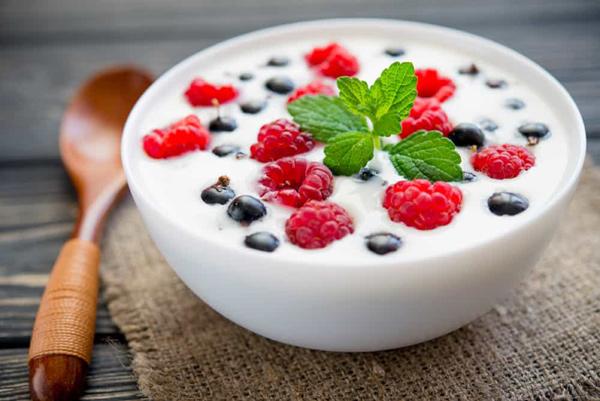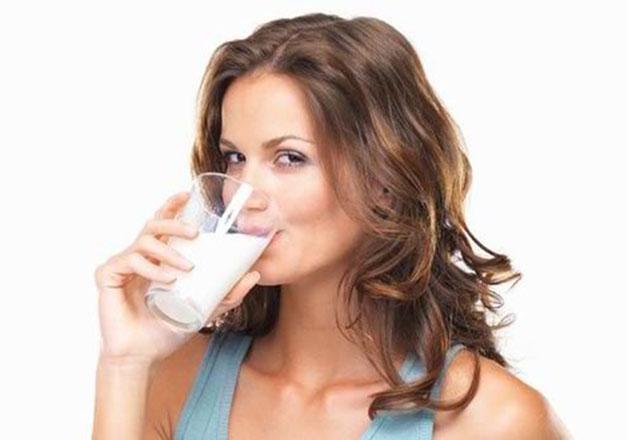You are here
Shopping for your protein
By Ayah Murad , Family Flavours - Jul 26,2020 - Last updated at Jul 26,2020

Photo courtesy of Family Flavours magazine
By Ayah Murad
Clinical Dietician
Milk, yoghurt and eggs are an important source of protein, vitamins and minerals, as well as good fats. They are also particularly rich in calcium, which is essential for healthy bones. Here, we look at tips for shopping and consuming them.
Dairy options can help you meet your health goals. For example, milk and yoghurt are excellent sources of calcium and protein. We don’t need to be afraid of whole milk versions even if they are high in saturated fat; this type of fat is not stored in the body and does not lead to weight gain — dairy fat can also help us feel full.
Supermarkets now stock many different varieties of milk. The most common in Jordan is still cow’s milk, but others include sheep and goat’s milk, as well as several imported plant-based substitutes such as coconut, soy, rice, oat and almond milk, which are good choices for those with lactose intolerance. Choose the unsweetened organic option whenever possible.
Cow’s milk is categorised mainly by its fat content:
• Whole or full-fat milk contains about 3.5 per cent fat
• Semi-skimmed contains about 1.7 per cent fat
• Skimmed milk contains 0.1 to 0.3 per cent fat
Even whole milk is relatively low in fat and semi-skimmed milk can be labelled as a low-fat food. Contrary to popular belief, lowering the fat content in milk does not affect the calcium content, so an adequate calcium intake can still be obtained from lower-fat dairy products. However, low-fat milk contains less energy and lower amounts of fat-soluble vitamins and isn’t suitable for children under two years.
Some supermarkets have now started selling milk with a 1 per cent fat content which has almost half the fat of semi-skimmed milk (low fat yet retaining a more creamy consistency). This is a good option for those who want to lower the amount of fat but still reduce the absorption of milk sugars.
Non-dairy milk
Coconut milk: A smart choice for the elderly, especially in managing and preventing Alzheimer’s disease. For a healthier heart, it helps raise the good cholesterol (HDL) and control elevated sugar level, especially when mixed in your food or hot beverages. Coconut milk also helps control body weight. Oat and rice milk: A smart choice for those with dairy or lactose intolerance. However, oat milk is not suitable for those with coeliac disease “gluten intolerance”. What makes oat or rice milk a better choice is its fibre content and most of the time its fortification with calcium and other vitamins, but that doesn’t mean it has fewer calories or is a healthier option for your heart, as it is still loaded with carbohydrates. Oat and rice milk are considered a good choice for those who want to gain weight.
Soy milk: Soy, in general, is rich in protein and female hormones, making it the best option for menopausal women. It is higher in protein than other plantbased milk. Sadly, most soy milk comes flavoured, so be aware of its sugar content and choose the organic brands.
Almond milk: A high protein option but still with less protein than regular milk. It is a smart choice for those with lactose intolerance, heart diseases, diabetes and coeliac disease. Almond milk is rich in Vitamin E which makes it a great choice for people with skin conditions, especially those with eczema and psoriasis. Also, it is a great option for people with heart disease as it is naturally low in fat.
Cheese contains the same beneficial nutrients as milk, but most cheese contains much more saturated fat and high levels of added salt, so it’s important to only eat full-fat cheese like cheddar cheese, occasionally and in small portions. Cheese, in general, is packed with casein protein. This type of protein is usually added to the supplements of bodybuilders to increase their body mass. Try to reduce your cheese consumption to once a week if you are trying to lose weight.
• Nabulsi cheese (the white square and salty cheese) is usually high in cholesterol and salt, so make sure to avoid it if you have heart disease and try to soak it in water overnight and boil it the next day to reduce its salt content. You may need to change the water several times to get rid of the saltiness
• Well-ripened sour cheese, like parmesan or blue cheese, is great for those with irritable bowel syndrome (IBS), but not yellow cheese. Any high-fat content cheese can increase flatulence
• The best cheese for weight loss and IBS or heart diseases is goat cheese, as it has lower amounts of lactose, sugar and fat.
Yoghurt is rich in protein and Vitamin B2. Some varieties contain living bacteria that are healthy for your digestive system (probiotics). Yoghurt can be made from whole or low-fat milk but be careful as fruit yoghurt often contains added sugar and sometimes added flavours and starch. Low-fat doesn’t necessarily mean low in calories. If you’re watching your weight, make your own yoghurt by mixing fruit with natural, low-fat, unsweetened yoghurt. Greek yoghurt is usually high in fat — always read the label.
Eggs are packed with a variety of nutrients, including protein, zinc, iron and Vitamins A, D, E and B12, but sadly lack Vitamin C. Three eggs can provide you with 20 grammes of pure protein. The old advice, to limit eggs to just a few each week, has been abandoned. There’s now no limit to the number of eggs you can eat in a week as part of a healthy balanced diet. In my opinion, to keep the variation of choice for body metabolism enhancement and a healthier body, try not to exceed three eggs a week. If you fancy starting the day with eggs, I suggest eating an egg omelette mixed with vegetables or a boiled egg topped with herbs alongside a glass of Vitamin C-rich unsweetened orange juice. This will help the body make the best use of the iron and help you digest eggs. Eggs are not suitable for those who have gallbladder stones or liver disease.
Want stronger bones?
Calcium helps build strong bones and teeth and is important for healthy blood pressure because it helps blood vessels tighten and relax when they need to. Milk and dairy products have long been considered important sources of calcium. Other sources of calcium include:
• Dried fruit
• Sesame seeds
• Almonds
• Soy
• Dark green leafy vegetables
Calcium can continue strengthening your bones until the age of 20 to 25 — when peak bone mass is reached. After this point, your bones can only maintain or lose their density and grow weaker as a natural part of the ageing process. Inadequate dietary calcium intake before this age can increase the risk of brittle bone disease and osteoporosis, as calcium is drawn from the bones as a reserve.
But did you know that calcium is less important for developing healthy bones than Vitamin D? Also, exercise is another vital factor in maintaining healthy bone structure and density. Lack of exercise in growing children will have a detrimental effect on their bones.
Did you also know that extra calcium intake can affect your health negatively? It can weaken your bones, create kidney stones, and interfere with how your heart and brain work. Make sure to consume Vitamin K27, which is responsible for carrying calcium from the blood and tissue back to bones.
Dairy products are a rich source of calcium. The following are examples of individual servings:
• 200ml milk (whole or full-fat, semi-skimmed or skimmed)
• 250ml calcium-fortified soy milk
• 40g hard cheese (cheddar, feta or mozzarella)
• 60g goat cheese
• 125g soft cheese (cottage cheese or labaneh
• 1 small bowl of low-fat plain or fruit yoghurt (150g)
• Fruit smoothie made with 200ml milk or 150g yoghurt
Reprinted with permission from Family Flavours magazine
Related Articles
Milk was the original “superfood”, believed to be rich in calcium and essential for strong bones and healthy teeth.
Eating yoghurt and low-fat cheese can cut the risk of developing diabetes by around a quarter compared with consuming none, according to a study of 3,500 Britons published on Wednesday.
AMMAN — As Ramadan begins, many look forward to a month of sugary desserts, but experts suggest modifying these traditional sweets or choosi


















